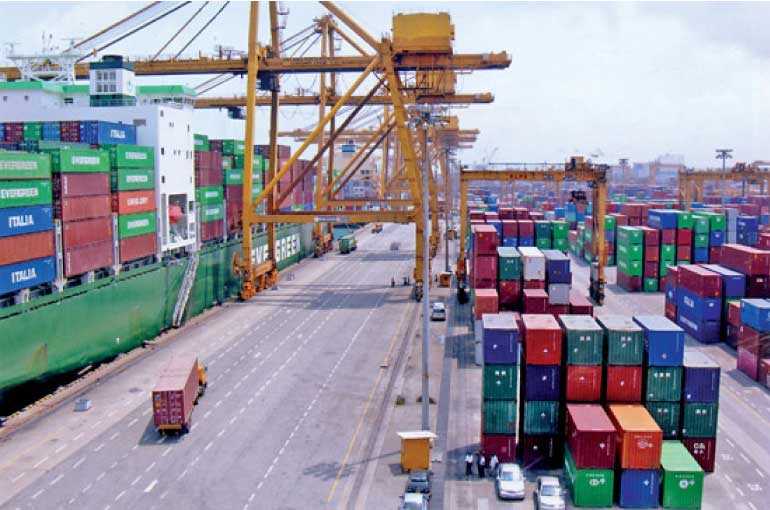Monday Feb 16, 2026
Monday Feb 16, 2026
Saturday, 8 June 2019 00:06 - - {{hitsCtrl.values.hits}}

Port of Colombo
The Government yesterday told Parliament that ownership of the East Container Terminal (ECT) of the Colombo Port will be held by the Sri Lanka Ports Authority (SLPA), and that Japan and India would only collaborate to develop the terminal.
According to the Government, majority ownership of the ECT will remain with the Sri Lanka Ports Authority (SLPA). The proposed joint venture company will allow SLPA to own 51% of the stake, while the remainder will be divided between Japan and India. However, negotiations on how much will be held by India, and how much by Japan, is yet to be decided.
Lands and Parliamentary Reforms Minister and Chief Government Whip Gayantha Karunatileka, moving a Ministerial statement in response to JVP MP Anura Kumara Dissanayake’s questions raised in Parliament on Tuesday, said: “A joint venture is proposed between Japan and India, with the SLPA retaining 51% stake of the terminal operations. Establishing a joint venture company, the Government expects to increase the competitiveness in port operations. By establishing a joint venture, there will be no transfer of ownership. The Ports Authority will continue to have ownership of the East Terminal.”
“The ownership of the Port will not be given to any country under any means. So, there will be no security risk. The majority stake in the proposed joint venture company is held with us. So, there is no issue in the ownership. Although it is shown as a sale, no sale took place. So no foreign country will interfere in port operations,” he added.
Touching on the basis of why the Government decided to develop the ECT, he pointed out that a new multi-purpose port in Kerala, India, could create more competitiveness for the Port of Colombo. “A multi-purpose port is now underway in Kerala Province, as a public-private partnership. The operations of this port will commence in October 2020, forcing us to face serious competition. We will have to compete with that port. At the moment, the operations are in the maximum level at Jaya Container Terminal (JCT) and South Asia Gateway Terminal (SAGT). So, it is necessary to develop the East Terminal soon. Also, ships that require a depth of 14.25 m are unable to berth in those jetties. We need to develop East Terminal to be competitive in the region,” held Minister Karunatileka, requesting the Opposition to avoid creating unnecessary fears.
Sri Lanka has opted for foreign financial support to complete the ECT before the multipurpose port in Kerala. “The provisions with Ports Authority will be adequate to complete the first phase of the East Terminal, as per the National Ports Development Master Plan. Developing the East Terminal by completing the first phase alone will not be adequate to increase the capacity of the Port of Colombo. Therefore, the Board of Directors of the Port Authority took a Board decision to obtain a loan, to go ahead with phase 1 and 2 simultaneously. The government of Japan has agreed to provide a concessionary loan,” he explained.
However, MP Dissanayake, demanding a debate during the Parliament week starting on 18 June, rejected the Government’s explanations. According to Dissanayake, not everything was above board in the agreement signed in May between Sri Lanka, India, and Japan.
“I have the Cabinet Paper Minister Sagala Rathnayake presented on 24 May, and the agreement was signed on 28 May. The plan is to award a 49% stake of the company established for the joint venture to Japan and India, while we retain 51%. But you could have kept Parliament informed in advance. This shows that you are in a hurry to go ahead with these plans. You don’t have the majority now in the Parliament, or public support. What power do you have to make such decisions? We will need a debate on this during the next Parliament week,” he held.